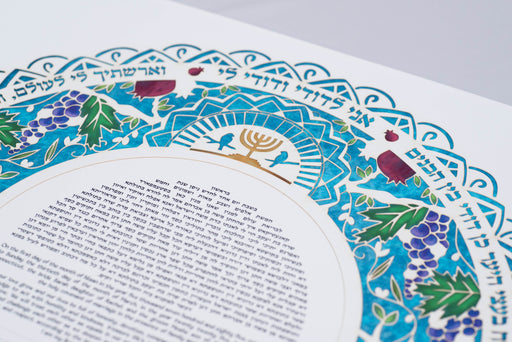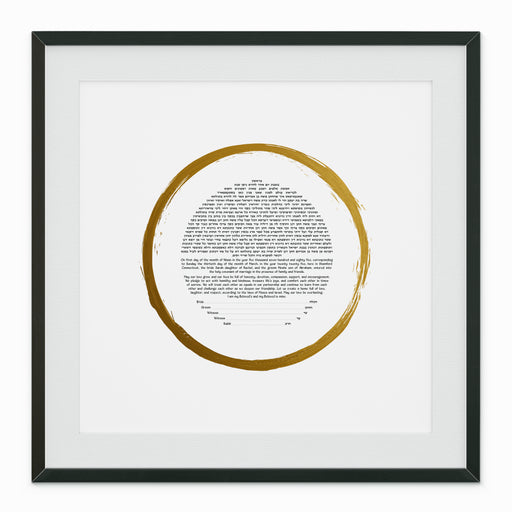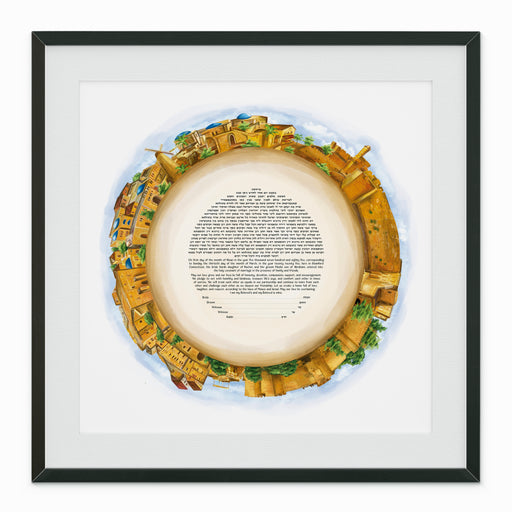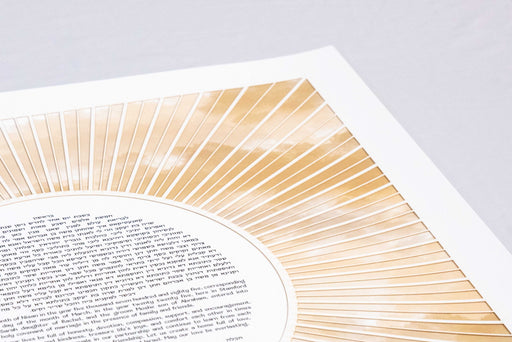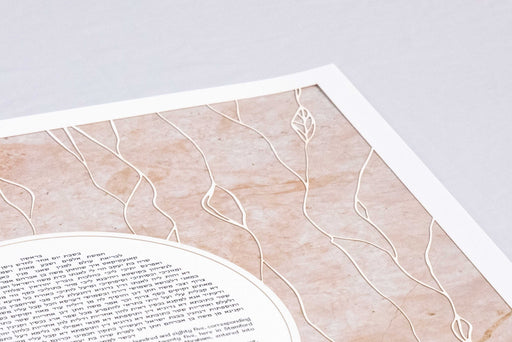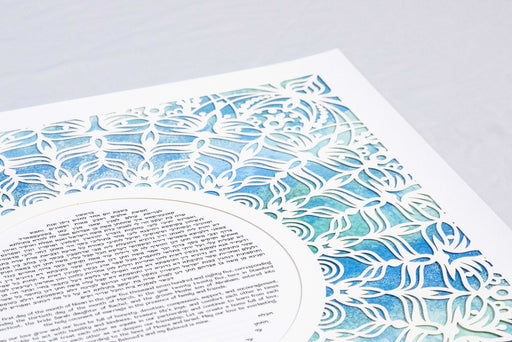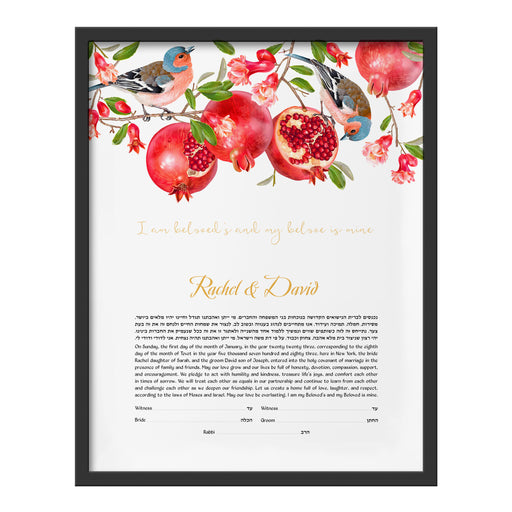
A Ketubah Ceremony: what you need to know about the Ketubah ceremony & signing
Share
Table of Contents:[hide]
By Aviva Gat
A Ketubah ceremony is not to be confused with a wedding ceremony. The Jewish Ketubah marriage contract is actually signed at its own separate ceremony that takes place before the wedding. It is often a much more intimate event and includes its own rituals and practices.
Keep reading if you are planning a Jewish wedding and want to know more about the ceremony for signing your Ketubah.
What is a Ketubah ceremony?
A Ketubah ceremony is a secluded ritual regarding the Jewish marriage contract. During this ceremony, the Ketubah document is filled out, reviewed, and signed by the Ketubah witnesses.
A Ketubah outlines the terms of marriage for the couple. These terms, which may be traditional or more secular, must be agreed upon for a Jewish wedding to take place. Once the Ketubah is signed, the couple is free to complete the wedding ceremony and effectuate their marriage.
When is the Ketubah ceremony?
The Ketubah ceremony takes place before the wedding. Today, most Jewish couples will conduct the Ketubah ceremony a half hour to an hour before going under the Chuppah. This is convenient because all parties are already present in one place for both marriage rituals. Orthodox couples might choose to conduct the Ketubah ceremony during the husband’s Tisch ceremony, which takes place right before the wedding.
On the other hand, some couples may choose to sign the Ketubah even earlier so that it does not interfere with their “first look” before the wedding. These couples might sign their Ketubah the day before the wedding.
Who is present at the Ketubah ceremony?
Who is present at the Ketubah ceremony depends on the religious affiliation of the couple and their preferences. For a Ketubah ceremony to take place, the groom, a rabbi, and two witnesses are necessary. Today, most secular couples also include the bride in the ceremony, as well as close family and friends.
The two witnesses are the most important participants in the ceremony. It is their job to watch carefully to ensure the Ketubah is filled out correctly. Their signatures are required for the document’s validity. Jewish law states that Ketubah witnesses should be virtuous, observant, bar-miztvahed men who are not related by blood or marriage to either the bride or groom. [1] Today, most conservative and reform rabbis will accept women as Ketubah witnesses. Couples generally choose their close friends or people they care deeply about to participate as their witnesses at the Ketubah ceremony.
What happens during a Ketubah ceremony?
A Ketubah document is filled out and signed during the Ketubah ceremony. The ceremony usually starts with the rabbi explaining the terms defined in the document. The rabbi will fill out the document with the date, location, and names of the bride and groom as well as their parents. Everything must be filled out carefully and precisely to ensure the legitimacy of the Ketubah.
Once the document is filled out, the participants enact a “kinyan,” which is the ritual of when the husband barters for the exclusive rights to marital relations with the bride. Contrary to popular belief, the husband does not “acquire” his wife the way he might acquire an object, rather he is acquiring the right to be with her alone.[2]
During the kinyan the groom barters for his exclusive rights and accepts his obligations according to the Ketubah contract.[3] In the ritual, the rabbi or a witness will take the place of the bride and hand a handkerchief or garment to the groom. Once the groom grasps the cloth the kinyan is made and the groom is obligated under the contract.
Witnesses should take care to observe the ceremony and will sign the document once the kinyan is completed. According to Jewish law, only the witnesses are required to sign the Ketubah during the Ketubah ceremony.[4]
It is interesting to note that Jewish law does not require signatures from the rabbi, groom, or bride. Today couples may choose to sign their Ketubah during the Ketubah ceremony to signify their commitment to each other.
This completes the Ketubah ceremony, however, the Ketubah does not go into effect until after specific blessings are recited at the wedding ceremony and the couple unites under one roof or spends time alone together.
Preparing for your Ketubah ceremony
Understanding the Ketubah ceremony is an important part of planning your Jewish wedding. Keep reading to learn more about Ketubahs.
- What is a Jewish Ketubah marriage contract
- How to choose a Ketubah text
- How to fill out a Ketubah
- Ready to embark on your Ketubah journey? Delve deeper into traditions, rituals, and personalized touches on our home page! Discover More
[1] Rabbi Aryeh Kaplan (1983). Made in Heaven. Moznaim Publishing Corporation.
[2] Student, G. (2015, January 27). Do Husbands Own Their Wives? Torah Musings. https://www.torahmusings.com/2015/01/husbands-wives/
[3] Rabbi Aryeh Kaplan (1983). Made in Heaven. Moznaim Publishing Corporation.
[4] Rabbi Aryeh Kaplan (1983). Made in Heaven. Moznaim Publishing Corporation.
By Aviva Gat
Aviva Gat is a journalist, author, and content writer specializing in various topics including religion, culture, health, & technology. She has a B.S. in Journalism and Religion from Boston University and an M.B.A. from Tel Aviv University.
FAQ on what is a Ketubah marriage contract
- What is a Ketubah?
- Who owns a couple’s Ketubah?
- What are the obligations in a Ketubah?
- What makes a Ketubah kosher?
- What is the value of a Ketubah?
- What is the Ketubah’s part in a Jewish wedding?
- Can you get married without a Ketubah?
- Can interfaith couples have a Ketubah?
- Can you replace a Ketubah?
- What does a traditional Ketubah say?
- What is a Ketubah in Hebrew?
- What is written in a Ketubah?
- Can you write your own Ketubah?
- What is the Lieberman clause in a Ketubah?
- How do you fill out a Ketubah?
- What do you write on a Ketubah?
- What is the oldest Ketubah?
- What was a Ketubah in ancient Hebrew times?
- What is the origin of a Ketubah?
- When did Ketubahs begin?
- Is the Ketubah from the bible?
- Is a Ketubah a legal document?
- Is a Ketubah legally binding?
- Is a Ketubah a prenup?
- Do I need a Ketubah and a marriage certificate?
- Who signs a Ketubah?
- What is a Ketubah witness?
- Can a blood relative sign a Ketubah?
- Who can be a Ketubah witness?
- Why do Jews sign a Ketubah?
- What is needed for a Ketubah signing?
- Is a Ketubah signed in Hebrew?
- What is the honor and obligation of signing a Ketubah?
- What is a Ketubah ceremony?
- When is the Ketubah ceremony?
- Who is involved in the Ketubah ceremony?
- What happens during a Ketubah ceremony?
- Who reads the Ketubah at a wedding?FAQ on what is a Ketubah marriage contract
What is a Ketubah?
A Ketubah is a Jewish marriage contract that outlines the duties and obligations of the husband and wife during their marriage as well as a settlement the husband owes to the wife in the case of divorce.
What does a Ketubah symbolize?
The Ketubah symbolizes the agreement God and Israel entered at Mount Sinai. Moses wrote the Book of the Covenant, detailing the mutual obligations and duties between God and Israel. When a man and woman agree to get married, they are entering their own covenant reminiscent of the agreement between God and Israel.
Who owns a couple’s Ketubah?
The bride owns the couple’s Ketubah. The Ketubah document is presented to the bride during the wedding ceremony. The bride must safely keep the document to ensure it doesn’t get lost.
What are the obligations in a Ketubah?
According to the Ketubah, the husband is obligated to honor and support his wife by providing food, clothing, shelter, conjugal rights, and other household needs. The woman is obligated to follow Jewish laws applying to married women. The husband is also obligated to pay a settlement to the bride should the couple get divorced.
What makes a Ketubah kosher?
A Ketubah is kosher if it is written in a way that it cannot be altered. The paper and ink must not be erasable and there must not be extra space where text can be added. It must also be signed by two witnesses who meet the relevant standards.
What is the value of a Ketubah?
The value of a Ketubah is estimated anywhere from $6,000 to $45,000. In a traditional Ketubah, the divorce settlement payment is 200 zuzim (silver coins). The Ketubah also includes a dowry of 100 zakukim (gold coins) and an additional payment of 100 zakukim. The amounts are halved if it is the second marriage for the bride. Estimates of what the Ketubah is worth are based on the price of silver and gold today, as well as inflation. The value of the Ketubah is supposed to be enough for the woman to invest so that she can support herself and her children.
Today many couples choose to write different amounts and different currencies in their Ketubahs. It is advised not to use exaggerated sums in your Ketubah.
What is the Ketubah’s part in a Jewish wedding?
A Ketubah is a marriage contract that must be signed before a Jewish wedding ceremony. The Ketubah is signed at its own ceremony and it is presented to the bride during the wedding. A wedding cannot commence if the Ketubah has not been signed. The Ketubah only goes into effect after the blessings at the wedding and the couple joins together in their home.
Can you get married without a Ketubah?
A Jewish wedding requires a Ketubah. You can get married secularly without a Ketubah, but for your wedding to be according to Jewish laws and customs, a Ketubah is required.
Can interfaith couples have a Ketubah?
Yes. Today many interfaith couples choose to have a Ketubah. Interfaith couples can choose Ketubah text that focuses on their love, commitment, and partnership, rather than on religious traditions and customs. Couples can also write their own Ketubahs including their vows to one another.
Can you replace a Ketubah?
Yes, if you lose your Ketubah, you are obligated to replace it. According to Jewish law, a couple cannot live together without a Ketubah. A replacement Ketubah is called a Ketubah deirkasa (כתובה דאירכסא), meaning “Ketubah for the lost.”
Learn more about the Jewish Ketubah marriage contract
FAQ on the text of a Ketubah
What does a traditional Ketubah say?
A traditional Ketubah says the terms of a marriage for a husband and wife. It starts with logistics, including the date, place, and the names of the bride and groom. Next, it includes the husband’s declaration toward his wife, including his promise to provide. Next, a traditional Ketubah outlines a settlement payment due should the couple get divorced as well as the amount the wife brings to their marriage through her dowry. The Ketubah ends by saying the contract is in effect from the time it is signed until forever.
What is a Ketubah in Hebrew?
A Ketubah in Hebrew literally means “that which is written.” It comes from the word to write, lichtov (לכתוב). Ketubahs are actually not written in Hebrew. They are written in Aramaic, which was the vernacular at the time they were legislated.
What is written in a Ketubah?
Written in a Ketubah are the duties and obligations that a man and woman accept upon getting married. What is written depends on the Ketubah text version of your choice. Today there are multiple versions of Ketubah texts ranging from very traditional and religious to secular and modern.
Can you write your own Ketubah?
Yes. Today many modern Jewish and interfaith couples choose to write their own Ketubah text. You may choose to write your vows to your partner regarding your love, partnership, and commitment. You may also write about how you envision your home and family or what you promise to bring to your marriage.
What is the Lieberman clause in a Ketubah?
The Lieberman clause in a Ketubah is a section added to conservative Ketubahs that says a divorce can be initiated by either the bride or groom. Added in the 1950s by Rabbi and theologian Saul Lieberman, this clause ensures that women can initiate a divorce even if their husbands do not want to grant one.
How do you fill out a Ketubah?
A Ketubah is generally filled out by the rabbi overseeing the marriage. The rabbi will fill out the date and place, the names of the couple, and the financial details of the document. Learn more about filling out a Ketubah
What do you write on a Ketubah?
In traditional Ketubahs the text is already written and your rabbi will fill out the details including the date, location, names of the bride and groom, and financial details. If you choose to write your own Ketubah you can write your vows to your marriage and your partner. You might want to write about how you envision for future home and family and what you promise to bring to your marriage.
Learn more about the Ketubah text here
FAQs on the history of Ketubahs
What is the oldest Ketubah?
The oldest known Ketubahs are from the time of the Babylonian exile in 586-536 BCE. During this time, women needed protection should men leave. Ketubahs also became proof of purity when intermarriage increased.
What was a Ketubah in ancient Hebrew times?
The Ketubah started in ancient Hebrew times as an oral agreement. It later became legislated that a written document was necessary to ensure the Ketubah could not be disputed. In ancient Hebrew times, couples used scribes and artists to create beautiful Ketubahs on papyrus so that the document could be hung on the wall in a couple’s home.
What is the origin of a Ketubah?
The Ketubah originated in ancient times when it was customary for men to provide payment to the family of their bride. This tradition likely began to compensate the family for the loss of income when losing a contributing member of their household. Over the years this tradition evolved to ensure the woman was taken care of if her husband left or died.
When did Ketubahs begin?
Ketubahs officially began around 100 BCE when the Sanhedrin led by Shimon ben Shetach legislated that couples were required to enter into a Ketubah upon marriage. This legislation stated that a man’s entire estate would be mortgaged in the document, ensuring that the debt was as important and collectible as any other debt.
Is the Ketubah from the bible?
Ketubahs are referenced in the bible, including in Exodus in the Torah. However, the Torah does not require a Ketubah. It is referenced more as a custom from the time period.
Learn more about the history of Ketubahs
FAQs on the legality of Ketubahs
Is a Ketubah a legal document?
Historically, a Ketubah was the legal document for entering a Jewish marriage. Today, Ketubahs are more ceremonial, unless you are in Israel. In Israel, Ketubahs serve as the official legal marriage contract issued by the government for Jewish couples.
Is a Ketubah legally binding?
A Ketubah is not legally binding outside of the state of Israel. Civil courts in most countries will not enforce the document. However, in Israel Ketubahs are fully enforceable by the state.
Is a Ketubah a prenup?
A Ketubah could be called the original prenup. Like a prenuptial agreement, Ketubahs outline what a wife is owed in the case of a divorce and they serve to protect the wife’s assets that she brought to the marriage in the form of her dowry.
Do I need a Ketubah and a marriage certificate?
Yes, if you live outside of Israel, you need a Ketubah and a marriage certificate. Depending on where you live, your government will have a specific marriage contract to ensure your marriage will be legally recognized. If you live in Israel, your Ketubah is your government-issued marriage certificate.
Learn more about the Ketubah and the Law
FAQs on Ketubah signatures
Who signs a Ketubah?
A traditional Ketubah is signed by two Ketubah witnesses. In some customs, the groom also signs the Ketubah to ensure he is aware of his obligations. Modern Ketubahs can also be signed by the bride.
What is a Ketubah witness?
A Ketubah witness signs a Ketubah for a bride and groom. According to Jewish law, witnesses should be virtuous, observant, bar-mitzvahed men who are not related by blood or marriage to the bride or groom. Ketubah witnesses participate in the Ketubah signing ceremony and are responsible for ensuring the validity of a Ketubah. It is a great honor and responsibility to be a Ketubah witness.
Can a blood relative sign a Ketubah?
No. Ketubah witnesses should not be related by blood nor by marriage to the bride or groom. Witnesses should be objective parties who are looking out for both the bride’s and groom’s best interests.
Who can be a Ketubah witness?
Ketubah witnesses should be people who are close to the bride and groom and will look out for their best interests. You might choose close friends, mentors, teachers, or other people you are not related to by blood or marriage. Jewish law requires witnesses to be observant Jewish men, however, modern Ketubahs can also be signed by women.
Why do Jews sign a Ketubah?
Jews sign a Ketubah to ensure men are aware of their obligations in marriage and women are protected in the case of divorce. The Ketubah’s settlement payment is meant to deter men from leaving their wives, but also ensure a woman is financially taken care of in the case of divorce or if her husband dies.
What is needed for a Ketubah signing?
A Ketubah signing requires a written document, as well as a rabbi and two witnesses. The rabbi will review the Ketubah terms with the witnesses and will officiate a “kinyan” ceremony with the witnesses and the groom. Once this ceremony has taken place, a Ketubah may be signed.
Is a Ketubah signed in Hebrew?
Traditional Ketubahs are signed in Hebrew. Today some couples choose to write their Ketubahs in English or the language of their choice. Modern Ketubahs can be signed in whatever language the couple chooses.
What is the honor and obligation of signing a Ketubah?
It is a great honor to be chosen to participate in the intimate Ketubah ceremony. It means the couple trusts and feels close to the witness. The witnesses are obligated to review the Ketubah and ensure the groom understands his responsibilities. They must also watch carefully during the ceremony to make sure everything is done correctly.
Learn more about Ketubah witnesses
FAQs on the Ketubah ceremony
What is a Ketubah ceremony?
A Ketubah ceremony is an intimate ritual for signing the Ketubah. The Ketubah ceremony is separate from the wedding ceremony and must be completed before the wedding can take place.
When is the Ketubah ceremony?
The Ketubah ceremony must take place before the wedding ceremony. Many couples choose to have the Ketubah ceremony an hour or half hour before their wedding because every party is already conveniently in the same place. Orthodox couples might decide to conduct the Ketubah ceremony during the groom’s Tisch, which takes place before the wedding.
Who is involved in the Ketubah ceremony?
Jewish law requires the groom, a rabbi, and two witnesses. Today some couples may choose to include the bride and close family to watch the ceremony.
What happens during a Ketubah ceremony?
During a Ketubah ceremony, the rabbi will fill out the Ketubah and review it with the witnesses. Next, the groom and witnesses will enact a “kinyan,” which is an ancient ritual where the husband barters for the exclusive rights to marital relations with the bride. Once the kinyan is completed, the Ketubah is signed.
Who reads the Ketubah at a wedding?
At traditional weddings, the rabbi will read the Ketubah out loud so that the couple and the guests are aware of the terms of the contract. After the reading, the rabbi will present the Ketubah to the bride for safekeeping.
Learn more about the Ketubah ceremony



